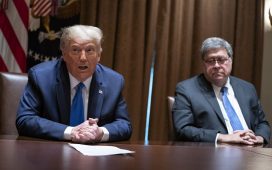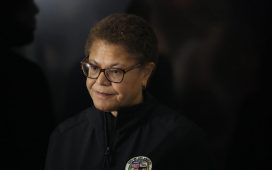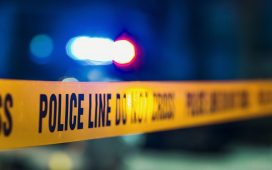With help from Stephanie Beasley and Maya Parthasarathy
PROGRAMMING NOTE: Morning Transportation will not be published from Monday, Aug. 26, through Monday, Sept. 2. We’ll be back on our normal schedule on Tuesday, Sept. 3. Please continue to follow Pro Transportation.
Story Continued Below
Editor’s Note: This edition of Morning Transportation is published weekdays at 10 a.m. POLITICO Pro Transportation subscribers hold exclusive early access to the newsletter each morning at 6 a.m. Learn more about POLITICO Pro’s comprehensive policy intelligence coverage, policy tools and services, at politicopro.com.
— Big airports across the nation were hit by a Customs and Border Protection computer system outage.
— NTSB is investigating a small plane crash in New Orleans that killed both the pilot and a journalist who was on board.
— Tesla is suing New York’s utility regulator over incentives for chargers.
IT’S MONDAY: Thanks for tuning in to POLITICO’s Morning Transportation, your daily tipsheet on all things trains, planes, automobiles and ports. Your regular MT host, Sam Mintz, will be back Tuesday. Reach us at smintz@politico.com or @samjmintz and bgurciullo@politico.com or @brigurciullo.
“And do you remember / When we hopped the P and B to NYC / You were only 17.”
LISTEN HERE: Follow MT’s playlist on Spotify. What better way to start your day than with songs (picked by us and readers) about roads, rails, rivers and runways?
PANIC AT THE AIRPORT: Customs computer systems were down for hours at airports across the country on Friday — an event that caused long lines and forced agents to process passengers through manual document checks, our Stephanie Beasley reported. John F. Kennedy International, Los Angeles International, Chicago O’Hare International, Washington Dulles International and Seattle-Tacoma International were among the many U.S. airports affected by what CBP called a “temporary outage” of its processing systems. The Toronto Star reported the disruption also affected Toronto Pearson International Airport, which expected Friday to be its busiest day of 2019.
Back to normal: JFK tweeted about the outage at 4:16 p.m. It was more than two hours later when CBP announced that systems were back online and that a malicious attack wasn’t suspected.
NOLA IN MOURNING: NTSB is investigating Friday’s plane crash in New Orleans that killed local news anchor Nancy Parker and stunt pilot Franklin J.P. Augustus. Witnesses said the plane, an Aerotek Pitts S-2B, appeared to be having engine problems after taking off, according to an NTSB statement on Saturday. “Much of the wreckage was consumed in a post-crash fire,” the agency said.
NTSB GETS VIDEO OF EARNHARDT ACCIDENT: Surveillance video caught last week’s accident in Elizabethton, Tenn., in which a plane with Dale Earnhardt Jr. (of NASCAR fame) and his family on board landed roughly, left a runway and came to a halt on a highway. “The airplane basically bounced at least twice before coming down hard on the right main landing gear, and you can actually see the right main landing gear collapsing on the video,” NTSB senior investigator Ralph Hicks said Friday during a news conference. The Cessna Citation Latitude caught fire, but it’s unclear exactly when.
What now? The cockpit voice recorder will go to NTSB’s offices in Washington, D.C. The plane didn’t have a flight data recorder, but “there were avionics on board that recorded some flight data that’s going to be very useful to us,” Hicks said. A preliminary report is expected in a matter of days.
4, 3, 2, 1: The Wall Street Journal’s latest story on the Boeing 737 MAX examines the assumptions that the manufacturer made regarding pilots as it developed the now-grounded jet. “In designing the flight controls for the 737 MAX, Boeing assumed that pilots trained on existing safety procedures should be able to sift through the jumble of contradictory warnings” — such as the ones the pilots in the Lion Air and Ethiopian Airlines crashes faced — “and take the proper action 100% of the time within four seconds,” the Journal wrote. “That is about the amount of time that it took you to read this sentence.”
Something to watch: The Journal reported the FAA is now “rethinking reliance on average U.S. pilot reaction times as a design benchmark for planes that are sold in parts of the world with different experience levels and training standards.”
And ICYMI: Aviation Week took a detailed look at the 737 MAX and its Maneuvering Characteristics Augmentation System. Here’s an abridged version.
CATHAY PACIFIC CEO EXITS: Rupert Hogg resigned Friday after two years as Cathay Pacific CEO. The South China Morning Post reports the exit was related to protests in Hong Kong and “Beijing’s displeasure at airline bosses insisting they would not interfere with what staff did outside work.” Augustus Tang is taking the reins at the carrier.
URAL AIRLINES PILOTS HONORED: The pilots who last week landed a passenger jet in a cornfield following a bird strike have received Russia’s highest honor from President Vladimir Putin. The flock of birds took out both engines on the Airbus A321 operated by Ural Airlines, but no lives were lost after Damir Yusupov, 41, and Georgy Murzin, 23, pulled off their landing. Here’s what Yusupov said about all the praise he’s received: “It feels odd and I’m shy.” Read more from The Associated Press.
TESLA SUING NEW YORK REGULATOR: Tesla has filed a lawsuit against the New York Public Service Commission seeking to block what the company argues are unfair advantages for other kinds of chargers, POLITICO New York Pro’s Marie J. French reports. “Tesla’s legal action highlights a conundrum for the electric vehicle industry and policymakers seeking to promote a transition from gasoline-powered cars,” Marie writes. “Most advocates for EVs see ‘range anxiety’ and slow recharging as two of the main barriers to greater acceptance in the consumer market, but promoting charging infrastructure has been challenging.”
$$$: The CBO has published a cost estimate for the Senate’s “hot cars” bill, S. 1601 (116). If the bill were to become law, NHTSA would need to mandate that new cars have a system that reminds drivers to check their backseat once the engine is off. CBO estimated that implementation would cost $3 million over a five-year period. NHTSA would need an additional employee as well as more cars to use for testing. Meanwhile, automakers would need to put systems in more than 16 million vehicles per year. Most companies would need to develop or buy alert technology, which would cost hundreds of millions of dollars.
ALL EARS: FMCSA will hold a pair of meetings to get public feedback on its recently released proposed rule to make several changes to its hours-of-service regulations, per a Federal Register notice. One of the meetings will be in Dallas, Texas, on Friday. The other will be in Washington, D.C., sometime in September.
— “NYPD arrests West Virginia man over subway bomb scare.” The Wall Street Journal.
— “UPS joins race for future of delivery services by investing in self-driving trucks.” ABC News.
— “A general, Newt Gingrich and Michael Jackson’s publicist push cut-rate moon plan.” POLITICO Pro.
— “Virgin Galactic unveils its new space base, but no flights yet.” Bloomberg.
— “Older people need rides. Why aren’t they using Uber and Lyft?” The New York Times.
— “China’s Ninebot unveils scooters that drive themselves to charging stations.” Reuters.
— “After years-long slump, Dulles International Airport bounces back.” The Washington Post.
— “Report: Judge who left auto emissions suit criticized climate science in emails.” POLITICO Pro.
— “Blue states get behind California ahead of auto fight.” POLITICO Pro.
DOT appropriations run out in 42 days. The FAA reauthorization expires in 1,503 days. Highway and transit policy is up for renewal in 408 days.








